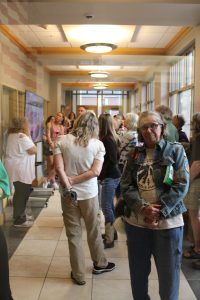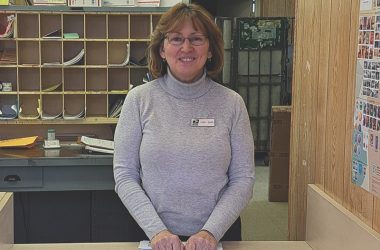Overflow crowd catalogs concerns about traffic safety, environmental and historical impacts
by Kate Shunney
After hearing from a crowd of concerned citizens split between the County Commission meeting room and a courthouse hallway, the Morgan County Planning Commission voted 6-4 on Tuesday to approve the Commercial Improvement Location Permit (CILP) for development of a KOA campground at the base of Cacapon Mountain just outside the village of Great Cacapon.

The Planning Commission’s May 23 monthly meeting was so packed with people that courthouse security officers stopped admitting individuals into the main Commission meeting room once it reached capacity, and directed the remaining people to stay in the courthouse hallway. The hallway was equipped with a large television monitor that live-streamed the meeting next door so attendees could hear the public comment and discussion by members of the Planning Commission.
Those who attended the meeting were able to sign up to give comments during the Public Hearing portion of the meeting, which stretched for close to two hours. More than 25 people spoke to planners about the proposed campground, which will have 173 sites arranged on roughly 50 acres along Cacapon Road. All but one of those speakers were opposed to the campground or voiced serious concerns about its impacts.
Dennis Vaughan, a resident of Cacapon River Rapids, spoke on behalf of many opponents of the project. He was given 20 minutes to speak by the Planning Commission. The rest of attendees were limited to two-minute comments. Vaughn created a petition against the KOA proposal two months ago, and told planners he had received more than 1,100 signatures on it in that time.

“There is a serious grass-roots concern about the campground,” he said.
Vaughan said concerns on the petition could be concentrated into two main points — the project is too big and it’s in the wrong place.
Vaughan said the campground is well-designed, but will change the “view shed” — what is visible from the famed Panorama Overlook.
He said his parents, who bought his property in Great Cacapon in the 1980’s, were attracted to the area by the Panorama’s four-state view. They had come to Great Cacapon to get away from congested life in the city, he told planners.
“That scene brought a lot of people here,” he said.
Vaughan said the campground will change the population density of Great Cacapon when it’s fully operational. He said if the campground is full and each RV comes with two to three people, that will add as many as 840 people to the area on a busy weekend. He noted the U.S. Census lists the population of Great Cacapon at around 520 people.
Nearby residents and second home owners have worries about litter, noise on the Cacapon and Potomac rivers, trespassing and pollution that might come with the campground.
“If you’re not aware of it, the vast majority of people relocated specifically to get away from noise, trash and congestion,” said Vaughan. “When we found those places, we were real happy.”
Vaughan said other concerns are water quality and availability if the KOA campground drills wells to feed the recreation area. There are also questions about the “safe movement of wastewater” from the campground to the Great Cacapon wastewater system.
The “worst” issue will be traffic safety, said Vaughan. His comment got applause from the meeting room and overflow crowd.
“This is ripe for all sorts of traffic problems,” Vaughan said. Those could include backups of RV traffic along Cacapon Road (Route 9) at the entrance to the campground, trouble with large vehicles being able to share the narrow and winding Route 9 down from the top of the mountain, and the impacts of any accidents on that section of road that would block emergency vehicles from getting through.
While the county requires a highway entrance permit from the West Virginia Division of Highways (DOH), there is no requirement for a traffic study, Vaughn pointed out. He asked if the county would still do that traffic study, even if it’s not required.
“We respectfully request you defer any decision,” Vaughan said, until after planners had read his petition, seen an illustration of the campground as seen from the Panorama, and conducted an independent traffic study.
At the close of Vaughan’s comments, County Planner Alex Moore told Planning Commission members that staff recommended approval of the Commercial ILP pending receipt of the Division of Highways entrance permit.
Moore said the county’s consulting engineer recommended approval, and the developer had met the county, state and federal permit requirements for the campground development.

Brooke Perry of Greenway Engineering — the developer’s engineering firm — told planners that Scenic LLC had given land to the Division of Highways to improve Cacapon Road near the proposed campground and the company would post a $100,000 bond to cover any roadwork required if the campground were to go under or not be built.
Citizens raised a variety of questions about the possible impacts of the campground on the area around Great Cacapon.
Brett Fyock asked how RVs could turn safely from U.S. 522 onto Route 9 in Berkeley Springs to come to the campground. He also questioned the impact of extra traffic on the bridge over the Cacapon River.
Bill Snitcher, a resident of River Ridge, said he was very concerned about the impact of traffic along Cacapon Road on the 130 homes at his subdivision. He noted that if Route 9 is blocked at the Panorama, that causes a 45-mile detour for residents to get to grocery stores or other amenities. Snitcher said traffic backups or accidents near the campground would also delay response time for emergency vehicles.
Another area resident noted that well water levels could be impacted by a need for large quantities of water at the campground.
James Thompson asked planners to deny the permit approval, saying mature trees won’t screen the view of the campground from the Panorama. “This is not the correct location for an RV park,” he said.
Andrea Thrush said people come into her business all the time and ask where the Panorama Overlook is. “It’s beautiful and has a history,” she said.
Fred Clifford echoed the historical value of the Panorama Overlook, which was mentioned by George Washington in his diaries as a surveyor in this area.
One attendee spoke in favor of the KOA campground, saying the tax revenue generated could be used to improve Great Cacapon. “We aren’t the only people who can enjoy the history and beauty of this area,” he said.
Jessica Thompson urged planners to pray over the permit decision and to be considerate of those who would be affected by the campground.
Roger Day, a lifelong resident of Great Cacapon, said the town and view “will never be the same” if the campground goes in. “Take this under consideration more than you have, maybe,” Day urged.
Samantha Davis said the land and water are a “major part of our heritage” worth protecting.
One attendee said she and her husband had just bought property in Great Cacapon a year ago and probably wouldn’t have if the KOA campground had been in place.
Sha Gomez told planners she is “very concerned” about the environmental impact of the campground, and her other major concern is that the area to be developed “could be sacred ground.”
One man said if the campground is built, many local people would use their First Amendment rights to protest it, “to make sure it’s a venture that won’t succeed.”
Liam Kennedy told planners “if it does not fit, you must dump it.”
Other commenters said the campground is too large, would cause traffic backups, and that excess activity in the area would disrupt wildlife that is often seen along the rivers.
Patti Miller, who bought the Panorama restaurant with her wife in 2005, said they purchased the property at the overlook to protect it. She said archaeologists do believe there was an early agrarian settlement at the mouth of the Cacapon and Potomac rivers, where the campground would be built. “Please take a look at the whole of this,” she asked planners.
Stacy McDonald lives in Great Cacapon and is concerned about the environmental impact on the rivers, and how busy the riversides will get with so many campers at that location.
“The river will be overrun,” she said. “It’s already tough for the locals now.”
Scenic LLC developer and property owner Aaron Bills was given 20 minutes to talk about the project — a time frame that was repeatedly marked by comments and questions from the crowd.

He said he “respects local feelings” about his proposal, but isn’t new to the area.
Bills said the land — the old Noland farm –was openly for sale, and he purchased it fairly. He said he chose a partnership with KOA for a campground because of their mission to bring families together in the outdoors in a healthy way.
“Yes, they will enjoy the views you presently do,” Bills said.
He said there are at least 23 subdivisions along the Cacapon River, which have allowed many people to enjoy a spot along the river. All of those required someone to cut up a larger property, take down trees, put in roads and infrastructure, he noted.
“You all like the freedom of your own property but want to restrict what I do on my property,” Bills said to the crowd. He challenged opponents to organize and do something other than criticize his plans.
After minor discussion by Planning Commission members about deceleration lanes planned for the campground, Marshall Younker made a motion to approve the Commercial Improvement Location Permit for the KOA campground, pending receipt of a highway entrance permit. After a second, the commission voted 6-4 in favor of granting the permit. Those in favor were Bill Clark, Dylan Shives, Benjamin Powell, Lance Strait and Larry Omps. Those opposed were Pat Logsdon, Julie Hartman, G.W. Easton and Aaron Wydysh.









